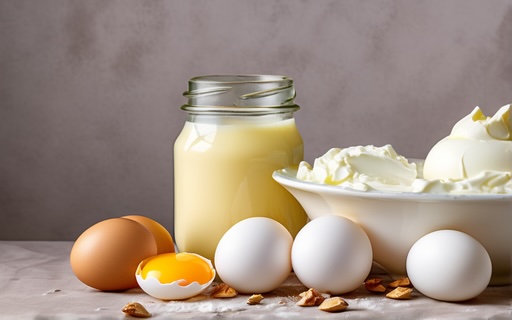Internet Asks: "Calories in Mayo"
Mayonnaise, often simply called mayo, is a staple condiment in many households and restaurants, cherished for its creamy texture and versatile flavor. Whether it's enhancing a sandwich, enriching a salad dressing, or serving as a base for various sauces, mayo is integral to numerous dishes. But, have you ever paused to consider the caloric content of this beloved condiment? This article delves into the nutritional aspects of mayo, focusing primarily on its caloric value.
sponsored links

Caloric Content of Mayonnaise
A standard serving of mayonnaise, which is typically one tablespoon (about 13-14 grams), contains approximately 90 to 100 calories. It's important to note that this can vary slightly depending on the brand and specific type of mayo.
Nutritional Breakdown
Beyond the caloric content, here's a closer look at the nutritional composition of a typical tablespoon of mayonnaise:
-
- Total Fat: 10 grams
- Saturated Fat: 1.5 grams
- - Cholesterol: 5-10 mg
- - Sodium: 70-90 mg
-
- Total Carbohydrates: Less than 1 gram
- Dietary Fiber: 0 grams
- Sugars: Less than 1 gram
- - Protein: 0 grams
- - Vitamins and Minerals: While not a significant source of vitamins and minerals, some brands of mayonnaise may contain small amounts of Vitamin E, Vitamin K, and Omega-3 fatty acids, depending on the type of oil used.
Note: These values are approximate and can vary among different brands.
Ingredients List
The classic mayonnaise recipe includes the following key ingredients:
- - Oil: The primary ingredient in mayonnaise, usually soybean or canola oil, contributes most of the calories and fats. These oils are high in monounsaturated and polyunsaturated fats, which are considered healthier fat types.
- - Egg Yolks: Provide texture and flavor, contributing proteins, fats, and certain vitamins like Vitamin D and Vitamin E.
- - Vinegar or Lemon Juice: Adds acidity, balancing the flavors and preserving the mixture.
- - Salt: Enhances taste and acts as a preservative.
Some variations and commercial brands may include additional ingredients like mustard, sugar, or preservatives to alter the flavor profile or shelf life.
Health Considerations
While mayonnaise adds a desirable creaminess to dishes, its high-calorie and fat content can be a concern for those monitoring their dietary intake, particularly for individuals managing weight or cardiovascular health. The type of oil used can also impact the healthfulness of mayo, with some oils offering more health benefits than others
sponsored links
Lower-Calorie Alternatives
While mayonnaise can fit into a balanced diet, moderation is key due to its high calorie and fat content. For those looking to enjoy the creaminess of mayo with fewer calories, consider the following alternatives:
- - Low-Fat or Light Mayonnaise: These versions contain fewer calories and less fat than traditional mayo, achieved by reducing the oil content or substituting with water or other lower-calorie ingredients.
- - Yogurt-Based Spreads: Plain Greek yogurt can be seasoned to taste similar to mayo but with significantly fewer calories and added protein.
- - Mayo Made with Olive Oil: Some brands offer mayonnaise made primarily with olive oil, known for its heart-healthy fats, potentially offering a healthier profile.
- - Avocado Mayo: Made from mashed avocados, this alternative offers healthy fats and a lower calorie count compared to traditional mayo.
Conclusion
Mayonnaise is a flavorful addition to many dishes but comes with a considerable caloric load due to its oil content. Understanding the caloric and nutritional aspects of mayo can help individuals make informed choices that align with their dietary goals. Opting for lower-calorie alternatives or moderating portion sizes can allow for the enjoyment of mayo's creamy texture without compromising nutritional well-being.
Disclaimer: This article is for informational purposes only and not intended as nutritional or medical advice. Always consult a healthcare professional or a registered dietitian for dietary guidance tailored to your personal health and nutritional needs.
sponsored links
References
- 1. BODi. 8 Delicious (and Healthier!) Mayo Substitutes. https://www.beachbodyondemand.com/blog/mayo-substitutes
- 2. USDA FoodData Central. Salad dressing, mayonnaise, regular. https://fdc.nal.usda.gov/fdc-app.html#/food-details/171009/nutrients
- 3. eMedi Health. 6 Reasons Why Homemade Mayonnaise Is Good for You. https://www.emedihealth.com/nutrition/health-benefits-homemade-mayonnaise
- 4. Mirzanajafi-Zanjani M, Yousefi M, Ehsani A. Challenges and approaches for production of a healthy and functional mayonnaise sauce. Food Sci Nutr. 2019 Jul 18;7(8):2471-2484. doi: 10.1002/fsn3.1132. PMID: 31428335; PMCID: PMC6694423.
- 5. Dr. Axe. Is Mayonnaise Nutrition Really as Unhealthy as You Think?. https://draxe.com/nutrition/mayonnaise-nutrition/
People are also reading...
Calories in Brown Sugar
Calories in M&M's
Does Kimchi Cause Cancer?
Kimchi Calories
Kimchi Cancer
Losertown Calc
Where is Kimchi in Grocery Store?
Mifflin St Jeor Calculator
Where to Find Kimchi in Grocery Store
Ready to level-up?
Create meal plans 10x faster, follow up with your clients through our mobile app, and never struggle with meal planning or recipe management again.